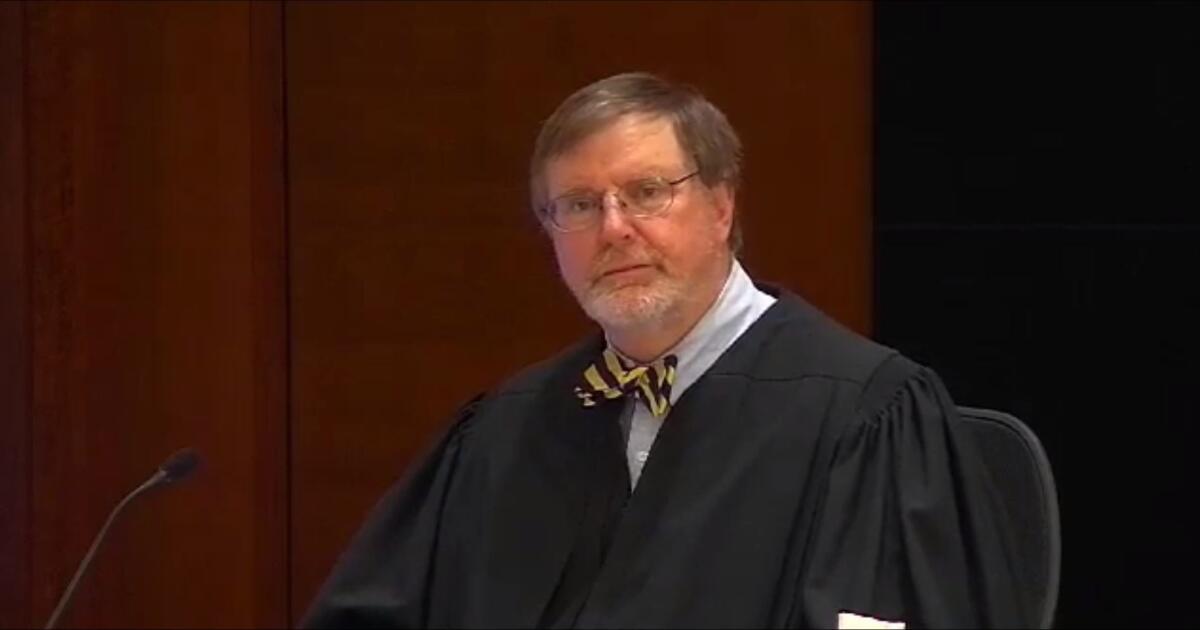Federal judge derided by Trump is a George W. Bush appointee known as a conservative jurist

Reporting from SEATTLE — The Seattle federal judge whom President Trump derided on Twitter on Saturday after blocking Trump’s executive order restricting travel to the U.S. is known for his conservative legal views, for a record of helping disadvantaged children that includes fostering six of them, and for dramatically declaring “black lives matter” during a hearing on police reform in 2015.
District Judge James L. Robart, 69, was appointed to the bench by President Bush in 2004, following a distinguished 30-year career in private practice that included his selection to the American College of Trial Lawyers, an honor bestowed on less than 1% of lawyers.
The judge made the most high-profile ruling of his tenure Friday when he temporarily invalidated Trump’s ban on travel to the U.S. from seven primarily Muslim nations. Washington state sued to block the order — with support from Minnesota and major corporations including Microsoft, Amazon and Expedia — arguing that it’s unconstitutional and would harm its residents, and Robart held that the state was probably correct.
The ruling did not sit well with the president, who on Twitter called Robart a “so-called judge” and the ruling “ridiculous.” Trump later falsely claimed the decision meant “anyone, even with bad intentions, can come into U.S.”
The comments are unlikely to sway Robart, said those who know him.
“Jim will give a wry smile, maybe adjust his bow tie a little bit and go back to doing his business,” said former Seattle U.S. Atty. John McKay, who worked with Robart for a decade at the law firm of Lane Powell Spears Lubersky. “He’s a very careful judge, and he’s conservative in the sense he looks at the law and tries to determine what that is, not what he wants. He’s conservative in his review of the law, but courageous in his application of it.”
Another former U.S. attorney in Seattle, Jenny Durkan, called Robart exacting: “We won some in front of him and we lost some in front of him, but we knew anytime we walked into his courtroom we’d better be prepared.”
That was evident Friday when Robart grilled a Justice Department lawyer, Michelle Bennett, asking if there had been any terrorist attacks by people from the seven barred countries since the Sept. 11 attacks. Bennett said she didn’t know.
“The answer is none,” Robart said. “You’re here arguing we have to protect from these individuals from these countries, and there’s no support for that.”
Robart, a graduate of Georgetown Law School, is an expert in patent and intellectual property law, and he issued a landmark decision — later upheld by the 9th U.S. Circuit Court of Appeals — in a lawsuit between Microsoft and Motorola that provided guidance in how to calculate reasonable rates for use of another company’s patents.
He’s considered a tough sentencing judge in criminal matters, especially in cases involving white-collar defendants, and he has overseen reforms at the Seattle Police Department since 2012, when it agreed to make changes in response to Justice Department findings that its officers were too quick to use force, especially in low-level situations.
Robart was holding a hearing in that case in summer 2015 — a time fraught with tension over violence by and against police officers around the country — when he surprised the courtroom by quoting the slogan of protesters.
“The importance of this issue to me is best demonstrated by the news,” he said, shaking his head and sighing heavily. “According to FBI statistics, police shootings resulting in death involve 41% black people, despite being only 20% of the population living in those cities. Forty-one percent of the casualties, 20% of the population: Black lives matter.”
More to Read
Sign up for Essential California
The most important California stories and recommendations in your inbox every morning.
You may occasionally receive promotional content from the Los Angeles Times.








